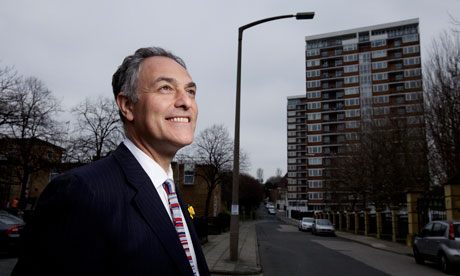Caring for England's poorest patients: Liverpool GP who welcomes all-comers
Everton has the most deprived population in the country – and associated problems of drink, drugs and poor lifestyle

Dr Simon Abrams, GP and senior partner at Great Homer Street medical centre in Everton. Photograph: Christopher Thomond for the Guardian
A busy Monday morning clinic in the Great Homer Street surgery, Everton, offers a ringside view of the circus of life. There are people picking up drugs for common heart complaints. Many patients are elderly, and ailments such as osteoporosis and arthritis are commonplace. One crack-cocaine addict comes in to pick up nine pills after, he says, being battered with a hammer.
If you ring other surgeries in poverty-stricken parts of Liverpool and ask how they are tackling these issues, staff refer you to Simon Abrams. "He's the doctor we send our troublesome cases to," admitted a nearby GP.
Abrams accepts any patient who has been violent or has menaced medical staff in Liverpool. A tall, thin man with a quiet demeanour, he says: "I am not looking for trouble. I take the view it takes two to tango and that it's not always the patient's fault. Disputes arise because of a lack of communication. In fact, from the patients sent to me, I cannot remember feeling threatened."
According to the database maintained by the Department of Health, Abrams serves the most deprived population in England. His surgery – a grim, squat, brick structure topped with barbed wire and with bars on the windows – sits just off the main thoroughfare going north from the city centre below the wide expanse of Everton Park.
Given that the recent Health and Social Care Act for the first time puts the duty on the government to "tackle and reduce" the gap in health inequalities, it is in surgeries such as Abrams' Great Homer Street where lives will need to be saved. With coronary heart disease and lung cancer rates particularly high, men in Everton die about eight years earlier than the average in England.
But Abrams, who gave up hospital medicine more than 15 years ago because he thought health was "more about people than diseases", says the issues in Liverpool are more about the "social side of life". "We have intergenerational problems here about the lack of work. We have a depopulating area. You cannot treat these problems in the conventional way."
The doctor's words are borne out by the statistics, with health inequalities shadowed by the evaporating life chances in the hinterlands of Liverpool's dockside. About 40% of residents in this part of Liverpool are officially "workless" – three times the national average.
With few jobs around and a dearth of opportunities, it's little surprise, perhaps, that only 29% of students leave school with five GCSEs graded between A* to C including maths and English – the lowest rate in England.
In Liverpool city, cash can be a matter of life and death. Poorer people are at greater risk of diseases related to inadequate diets, lack of exercise, smoking, poor pay and job insecurity. The thinking is that if you are unemployed you don't necessarily fall ill because of a lack of cash, but because you get depressed and fall into drink or fail to look after yourself.
Although the coalition plans to hand over more than £2bn to local councils once they take over public health, many in local government say this money will be undermined by council cutbacks. This trend has been highlighted by an analysis by Birmingham city council that shows the more deprived an area, the deeper the cut.
According to the Birmingham analysis, Liverpool is the region worst affected by the government's cuts. Liverpool council says there will be a budget gap of £141m over the next two years. With the council's controllable budget totalling £400m, that means slashing more than 10% of costs each year.
Paul Brant, Liverpool's deputy leader and a Labour councillor, says the effect will be to "wipe out" a lot of the public health gain.
In Everton there was a lot of hope riding on the rebuilding of rows of abandoned terraced housing, he points out. Many public health experts recognise that a stable home is essential to closing the gap in health inequalities.
Brant says: "All those streets were ready to be demolished, but the funding has dried up. All that has been cancelled. The money has gone. So we are left with a ghost town up there. All those empty houses will just be abandoned."
There is the grim prospect here that the number of people in need is likely to increase as a direct consequence of the government's policies. Hit by a combination of rising unemployment and reduced welfare benefits, there is plenty to worry about along the Mersey.
Read the full article here: http://www.guardian.co.uk/society/2012/may/22/england-poorest-patients-liverpool-gp
Read the full article here: http://www.guardian.co.uk/society/2012/may/22/england-poorest-patients-liverpool-gp
